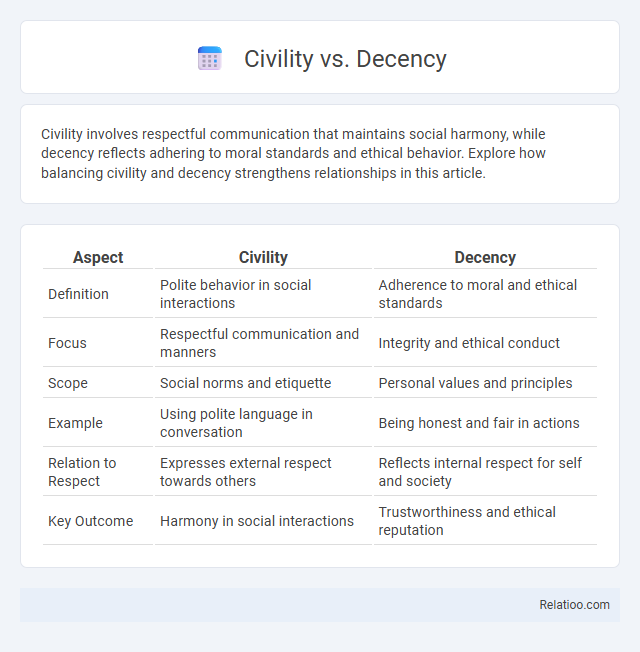Civility involves respectful communication that maintains social harmony, while decency reflects adhering to moral standards and ethical behavior. Explore how balancing civility and decency strengthens relationships in this article.
Table of Comparison
| Aspect | Civility | Decency |
|---|---|---|
| Definition | Polite behavior in social interactions | Adherence to moral and ethical standards |
| Focus | Respectful communication and manners | Integrity and ethical conduct |
| Scope | Social norms and etiquette | Personal values and principles |
| Example | Using polite language in conversation | Being honest and fair in actions |
| Relation to Respect | Expresses external respect towards others | Reflects internal respect for self and society |
| Key Outcome | Harmony in social interactions | Trustworthiness and ethical reputation |
Understanding Civility: Definition and Origins
Civility refers to the polite and respectful behavior that facilitates social harmony and constructive communication, originating from the Latin word "civilis," meaning "relating to citizens." Unlike decency, which centers on conforming to moral and social standards, civility emphasizes mutual respect and consideration in public and private interactions. Understanding civility helps you navigate social settings with empathy while fostering positive relationships rooted in courteous behavior.
What Is Decency? Core Principles Explained
Decency refers to the fundamental principles of respect, kindness, and moral integrity that govern your interactions within society. It emphasizes sincere consideration for others' feelings and upholding ethical standards without necessarily adhering to formal social rules. Understanding decency helps you cultivate genuine relationships based on compassion and fairness, distinguishing it from civility, which often centers on politeness and social etiquette.
Historical Perspectives on Civility and Decency
Historical perspectives on civility emphasize social manners and respect within community interactions, often rooted in maintaining order and hierarchy. Decency, historically, reflects moral standards and personal integrity shaped by cultural and religious values, guiding your behavior toward ethical conduct. The distinction between civility and decency highlights civility's role in public etiquette versus decency's foundation in inner moral principles.
Key Differences Between Civility and Decency
Civility refers to polite and respectful behavior in social interactions, often driven by societal norms and the desire to maintain harmony. Decency involves moral integrity and adherence to ethical standards, reflecting an inner sense of right and wrong beyond mere social etiquette. The key difference lies in civility emphasizing outward politeness and social respect, while decency centers on genuine ethical conduct and personal virtue.
The Role of Civility in Modern Society
Civility in modern society serves as the foundation for respectful and constructive communication, fostering cooperation and reducing social conflicts. While decency pertains to moral goodness and basic kindness, civility emphasizes courteous behavior and mutual respect in public discourse. Your ability to practice civility promotes inclusive environments where diverse perspectives can coexist harmoniously.
Decency in Social and Cultural Contexts
Decency in social and cultural contexts refers to the adherence to accepted moral standards and behaviors that promote respect and harmony within a community. Unlike civility, which emphasizes politeness and courteous interactions, decency involves deeper ethical considerations such as honesty, integrity, and fairness that shape your actions and relationships. Cultivating decency strengthens social cohesion by fostering trust and mutual understanding across diverse cultural settings.
Civility vs Decency in Political Discourse
Civility in political discourse emphasizes respectful communication and maintaining a polite tone, fostering constructive dialogue even amid disagreement. Decency goes beyond politeness, incorporating moral integrity and fairness in treating others, which helps build trust and mutual understanding in politics. Your engagement in political discussions benefits most when civility and decency coexist, ensuring debates remain respectful without sacrificing ethical standards.
How Civility and Decency Influence Personal Relationships
Civility and decency shape your personal relationships by fostering respect and trust through polite and considerate behavior. Civility emphasizes appropriate social conduct and etiquette, while decency involves moral integrity and kindness, both essential for meaningful connections. Practicing these virtues reduces conflicts and promotes harmonious interactions that strengthen emotional bonds.
Cultivating Civility and Decency in the Digital Age
Cultivating civility and decency in the digital age requires fostering respectful communication and empathy across online platforms, where anonymity often amplifies incivility. Civility emphasizes polite behavior and constructive dialogue, while decency involves adhering to moral standards and showing kindness, both essential for healthy digital interactions. Promoting digital literacy and encouraging accountability can help bridge the gap between civility and decency, creating more respectful and inclusive virtual communities.
Building a Balanced Society: Integrating Civility and Decency
Building a balanced society requires integrating civility--the respectful and polite behavior toward others--with decency, which emphasizes moral integrity and fairness in actions. You foster social harmony and trust by promoting both, ensuring interactions are courteous while upholding ethical standards. This dual approach strengthens community bonds and creates a culture where respect and moral values coexist seamlessly.

Infographic: Civility vs Decency
 relatioo.com
relatioo.com